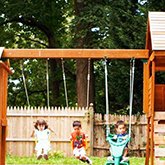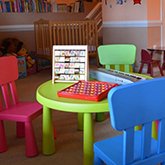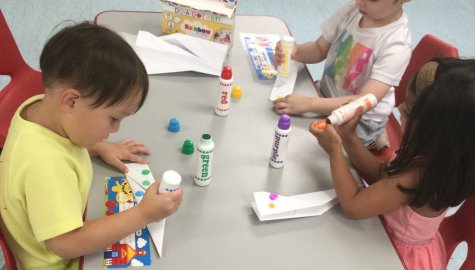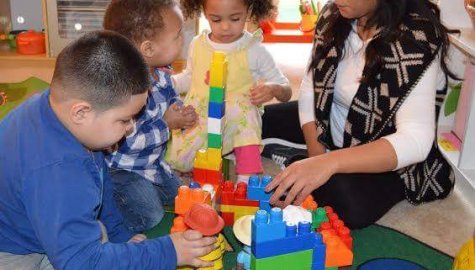
About Waldorf Daycares Near Me
Similar to Montessori schools, Waldorf daycares and preschools use mixed age classrooms and emphasize building independence. However, the Waldorf approach focuses on imagination and curiosity rather than targeted academic activities. Waldorf teachers help children learn how to think, rather than what to think, while using a consistent schedule that provides the security of a daily routine.
If you were to visit a Waldorf preschool, you would immediately notice the easy-going, home-like setting, where children might be singing songs, acting out a scene, listening to a story, painting, baking, or building with blocks. Teachers in a Waldorf preschool are all certified by the Association of Waldorf Schools of North America. They use imitation and repetition as core techniques, modeling good behavior instead of offering traditional academic instruction. Through this hands-off early education approach, teachers strive to encourage curiosity and independence while gently facilitating learning.
A typical day at a Waldorf preschool might begin with circle time, followed by a period of free play and group activities. Carefully selected stories are regularly told to help nurture the wonder and imagination of the kids as they interact with each other and their surroundings. Cooperation is encouraged and teachers only offer guidance when necessary. Children are not explicitly made aware that they are learning, but rather led to it through their playful explorations.
Materials are always natural and specifically chosen for their flexibility in use. For instance, dolls will be expressionless to allow children to impress upon them the emotions most appropriate to their play. Raw materials such as pine cones, sea shells, stones, colored cloth, etc. are typically in abundance. Waldorf daycares don't use traditional grading, and video or electronic media (including computers) are excluded from the facility. They employ an "all-weather" philosophy and children spend a lot of time outdoors, rain or shine.
A Waldorf preschool can be an excellent choice for parents looking to encourage their child's individualism and love of learning rather than focusing on academic skills. Children who enjoy predictability and a home-like atmosphere will thrive in a Waldorf environment, with the gentle, nurturing approach providing comfort to shy children and balancing out more aggressive children. Imaginative and free-spirited children would also feel right at home, while children with special needs can benefit from the Waldorf's central assumption that every child should be supported in developing at their own pace.
The Waldorf curriculum is decidedly not academic, with creativity and play taking center stage. This makes the Waldorf philosophy a poor fit for families that prefer to stress early reading or other academic skill building. They also do not offer access to technological devices such as computers or tablets. It is worth noting that the Waldorf approach can be found in early childhood education programs all the way through the high school level.
Other Waldorf Daycares Near Me
Recent Reviews for Waldorf Daycares
Shaw Little Kids Playhouse, Washington DC
"We love having our son at this daycare! He has been there since 6 months and is always happy when we pick him up. The staff are very kind and attentive and always share how his"
Read More
Florida Ave Schoolhouse, Washington DC
"She was amazing with my daughter and the only reason we left is because we moved out of state. I felt so comfortable leaving my baby with her and I felt like she cared for my baby"
Read More
People who searched for "Waldorf Daycares" also viewed
Frequently Asked Questions
How many waldorf daycares and preschools are there in the US?
There are 289 waldorf daycares and preschools in the US, based on CareLuLu data. This includes 175 home-based programs and 114 centers.
How much do waldorf daycares and preschools cost in the US?
The average cost of waldorf daycares and preschools in the US is $957 per month. This is the average price for full-time, based on CareLuLu data.
How many waldorf daycares and preschools offer infant care in the US?
Based on CareLuLu data, 161 waldorf daycares and preschools care for infants (as well as toddlers).
How many waldorf daycares and preschools offer part-time care or drop-in care in the US?
Based on CareLuLu data, 242 waldorf daycares and preschools offer part-time care or drop-in care in the US.
How many waldorf daycares and preschools teach a foreign language in the US (Spanish, French, Chinese, etc.)?
Based on CareLuLu data, 99 waldorf daycares and preschools speak at least one foreign language. Most common languages include Spanish, French, Hindi, Chinese and Arabic.
Top Resources Related to Daycares

How Much Does Daycare Cost? Check the Daycare Price Calculator
How much does full time daycare near me cost? Is home daycare more affordable than a center?
How much does full time daycare cost? Is home daycare near me more affordable than a center? Use our Daycare Tuition Calculator to find out average daycare tuition rates in your zip code.
See More
Child Care Center vs. Home-Daycare: Pros & Cons
Which environment is better, a child care center or a home-based daycare? The answer is simple...
During a child care seminar for parents and parents-to-be, I realized the differences between child care centers and home-based daycares were unclear to a lot of families. I was asked which environment was the best, center or home. My answer was simple...
See More
Preschool Teaching Philosophies in a Nutshell
Montessori, Waldorf, Reggio Emilia, High-Scope... which preschool teaching philosophy is the best?
Montessori, Waldorf, Reggio Emilia, High-Scope, Bank Street... Most likely you've never come across such terms, unless of course... you started looking for a preschool! Which preschool teaching philosophy is the best? Find out how they are different.
See More
Switching Daycares: 7 Tips for a Smooth Transition
Thinking of switching daycares? These 7 practical, expert-backed tips will help you prepare your child emotionally and make the change as smooth as possible.
Thinking of switching daycares? These 7 practical, expert-backed tips will help you prepare your child emotionally and make the change as smooth as possible.
See More
How To Get Your Child Care Tax Credit
Here are 10 things you need to know to claim your Child and Dependent Care Credit...
For most families, child care is the highest single household expense. But, there's good news! Uncle Sam is here to help and can offset some of your daycare costs. Here are 10 things you need to know to claim your Child and Dependent Care Credit...
See More
7 Gift Ideas for Child Care Provider Appreciation Day
Are you looking for gift ideas for Child Care Provider Appreciation Day? We've got 7 memorable suggestions to celebrate the ones who care for your little ones.
Are you looking for gift ideas for Child Care Provider Appreciation Day? We've got 7 memorable suggestions to celebrate the ones who care for your little ones.
See More
What to Look for During a Child Care & Preschool Tour
Make the most of your daycare tour, here's how to evaluate the program before your child enrolls.
The daycare and preschool tour is a (maybe even the) key moment in the decision making process, so it's important that you make the most of your daycare tour. Here's how to evaluate the child care program before your child enrolls.
See More
10 Tips for Finding Great Child Care
Here are 10 tips to help you find affordable and quality child care.
When I needed a daycare and a preschool for my girls, I spent days on Google, phone, and visiting in person. I toured 16 centers before settling for the one that felt right for us. Here are 10 tips to help you find quality child care more easily.
See More
How to Get Your Child to Share Their Day at Daycare & Preschool
"How was your day?" you ask your preschooler. If you're lucky, you'll get "Good." Here's why...
"How was your day?" you ask your preschooler. If you're lucky, you'll get "Good." "Why doesn't my little one tell me about her day?" you wonder. This is a parenting conundrum that baffles many. There are a few possible reasons...
See More
How to Find the Best Daycare for You
In this post, we'll walk you through how to find a daycare and criteria to help you narrow down options.
There are many things to consider when searching for the best daycare for your family, which can understandably leave you feeling overwhelmed. In this post, we'll walk you through how to find a daycare and criteria to help you narrow down options.
See More



















